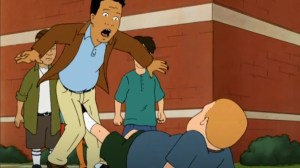When it comes to supposed sightings of UFOs, there have been so many that have occurred over the years that it’s difficult to spotlight the most famous of such incidents. When it comes to firsthand encounters with otherworldly visitors, however, you’d be hard-pressed to find a case as notorious as what happened to Travis Walton back in 1975. Rather than claiming that he was visited in his sleep by aliens, Walton vanished in front of multiple witnesses and wasn’t found for nearly a week, with the decades since seeing him regularly recount the traumatic experiences he suffered at the hands of intergalactic travelers. The experience is the focus of Shock Docs: Alien Abduction – Travis Walton, which premieres on discovery+ on February 18th.
Videos by ComicBook.com
On November 5, 1975, a seven-person logging crew drives home after a long workday in the Apache-Sitgreaves National Forest when they suddenly encounter a UFO.One of the men, 22-year-old Travis Walton, gets out of the truck to investigate.His crewmates are horrified when they witness a bolt of blue light flash from the alien ship that knocks Travis to the forest floor. Fearing Travis dead, the crewmates flee back to town and call the Sheriff.When a search of the area turns up no sign of Travis, puzzling questions arise.Was Travis truly abducted by aliens?Or did his coworkers murder Travis or have something to do with his disappearance and concoct the UFO story to cover their tracks? The six crewmen pass polygraph examinations, but rumors persist.The Walton story becomes an international media sensation and pushes the residents of rural Snowflake, Arizona to the brink.Years later, the film Fire in the Sky brings awareness of the story to a whole new group of UFO investigators.They uncover physical evidence that may prove alien visitation of planet earth.
ComicBook.com caught up with Walton and UFO expert Ben Hansen to talk about the horrifying incident, the new episode of Shock Docs, and if we’ll ever get undeniable proof of life beyond our planet.

ComicBook.com: You’ve been talking about this encounter that you had and this trauma that you went through coming up on almost 50 years ago. What is the thing that you get asked about the most and what is the thing that you wish you were never asked about again? It might be the same answer.
Travis Walton: Oh boy, that’s a deep one. Do we have time for that? I’d have to think about that one. But, wow.
There’s two separate aspects to this experience. One is the emotional, initial impact, the evolution of my reaction to it. And the other thing is the physical research, the evidence that was present at the time and the additional evidence supporting it that accumulated over time. Two completely separate lines of inquiry that are interesting, that some people are more interested in one over the other.
This has been 50 years. I personally sometimes have a hard time remembering what happened last week. But since this was such a powerful moment and powerful experience in your life, when you think back on it or when you talk about it, are your memories of this experience just as vivid today in 2022 as they were in 1975? Or are there some things that you have been able to either put behind you or maybe just the visual recollection of it doesn’t always come back to you as powerfully?
Walton: Well, it’s a psychological maneuver to try to not reexperience it when I’m asked to relate the impact of what was happening at the time. Probably the lingering thing that I don’t get asked too much about is just my speculations and my wondering about certain parts of it that I’m still wondering about that I haven’t been able to document or connect to other sorts of things, and that’s the other type of beings that I encountered and that’s really profound and gets ignored quite a bit because it’s not as, I don’t know, “Hollywood” as the alien type.
Travis is such an important figure when it comes to the overall human research into life beyond our planet and his encounter is one of the most famous in history. So, Ben, what surprised you most after reading about Travis to then finally meeting with Travis and collaborating with him?
Ben Hansen: That’s a good question. So I think, well … Let me say this: I lecture a lot on UFO witnesses and whether people are telling the truth or not. And I feel very honored to have met Travis and to have become friends with him and to still be part of the ongoing research there. Because a lot of people I talk to, even if I think that a real story has happened to them, they don’t continue searching and trying to find answers for themselves. It can be very traumatic and they put it behind them. Travis continually has sought to find what can be found at the location where we’ve gone several times now or looking for new studies that might corroborate what he experienced.
The other thing is that the consistency and the humility when you finally meet him, not that it speaks to any of the veracity of a witness’ claims, but the reluctant witness is somebody that I relate to. Because people who come out and instantly are promoting or coming up with what I call “legendizing” new experiences and things has me question the original account. But Travis has always been very, no pun intended, down-to-Earth, very humble.
The story is what it is, and that’s what the truth is like. You can’t change it, and I think he finally embraced that. So I guess, to answer your question, what impressed me or what struck me the most about him is that this is something he would never wish upon anyone to happen and he’s weathered throughout his whole life, he’s been that guy. His whole life and everything that changed for him, to be able to have that mental strength and fortitude, is quite amazing to me.
Ben, you mentioned the other encounters that other folks have claimed to have been part of, and also just the doubters and the cynics that Travis has faced in his life. Travis, when other people, whether they contact you directly or you just hear about other stories, I’m sure there are many more outlandish experiences that get brought up to you. Do you feel that, given the cynicism and the doubt that you faced, do you find yourself always wanting to side with the people who have claimed to have these experiences or do you still allow yourself to say, “Well, this does sound a bit more believable than what this other person’s story might have been,”?
Walton: Well, I’ve been pushed to a point where I try to stick to the facts, the verifiable evidence. There are things that I could tell you that I can’t back up. It’s not documented, so I don’t talk about it so much. But, to me, in regard to my own personal experience, I profoundly, deeply believe in the connection in these things, but I couldn’t prove it to anybody. To me, it comes down to a study of people and their reaction to things they do or don’t want to believe.
I’m even planning a book on the subject, just, how do you know what’s true? There are techniques, patterns that work in that regard. And Ben probably is aware of that philosophy. He had a show called Fact or Faked. How do we evaluate, how do we know what’s true? So much is being given to us by advertisers and politicians and whatnot. How do we know what to rely on, what to put in the, what Stan called the “maybe file”? Stan Friedman, he’s a UFO researcher.
The Maybe File. That’s maybe not as snappy as a title as The X-Files or something like that, but would probably have a lot more cases in the Maybe File, for sure. For me, one of my first introductions to your case was the movie based on your own book, Fire in the Sky. Now this new documentary is probably going to be a more accurate reflection of what you really went through and the whole case surrounding it, but for anyone who’s going to be most familiar with Fire in the Sky, do you have specific qualms with that film or specific issues that are the much more Hollywood version of what happened?
Walton: Well, in most of my talks, I have to say, “Well, that was the Hollywood version.” I’m grateful that it put people in a situation to experience on the emotional level what we went through. That’s conveyed very well. As far as it being a documentary, not even close, but maybe someday we’ll have a remake that sticks closer to the facts of the matter. But I’m forgiving of the fictionalizations to a certain extent because I’m grateful that people were at least about to be put in, “What would it be like to live through that?” At the same time, I would like people to know that it really wasn’t like that in some aspects.
That’s really interesting, because I think everybody who’s even seen a trailer for that movie feels a visceral reaction which serves to express that level of invasion, which also impacted your emotional state and your mental state and psychological state, as opposed to just physically seeing the invasion presented in that movie.
Walton: Yeah, it generates a kind of empathy that has led people to be willing to look at the facts and these things have mounted up. The research that Ben was referring to, coming back to the site where, 50 years later, discovering physical evidence that’s irrefutable. Ben can talk about that because he did the research on the effect on the local tree growth there.
Given all of your research into this phenomenon, do you think that of all of the reported cases of UFOs or aliens or what have you, do you think they all come from, say, the same community, the same group, the same part of the galaxy, the same species, or do you think it’s as complex an issue as for every country in the world, that’s how many different places are the origin for these otherworldly visitors?
Hansen: Well, circumstantially, of course, because we don’t have hard evidence of this, but when you talk to enough people, I think the descriptions of these beings are different enough and the types of encounters, what they do, the messages that are given, I think there’s enough to say that we probably have at least a handful of different visitors and they could all have different agendas.
What I have a problem with is clumping them all into one. And so they’ll take a stance on it and someone will, some of the well-known lecturers out there or people that they follow will say, “Oh, they’re all benevolent, love and light.” Then you have the other crowd that says, “No, they’re all here to destroy us. And we’re in big trouble.” And it could be all of the above.
It could be that these different agendas are at battle, and some people will say that there’s a battle going on. I don’t know about that. I don’t go as far to say there’s a federation of sorts. There might be, but I think we need to be open to the fact that, number one, it’s well-evidenced in my mind that we are being visited. Number two, we need to take notice of it because there are national security implications. And then, number three, they could be different agendas.
Walton: Well, I’d like to refer to Stan Friedman’s research on that. One comment he had was, “Why don’t they come down and make themselves known?” And he said, “Why would they make contact with these beings whose principal interest seems to be entering tribal warfare?” We’re a bunch of savages and we haven’t advanced to a point where it would be constructive for them to do so.
I can’t help but feel concerned and sympathize with the physical trauma that you went through, you were able to recover from, and bounce back from. But all of the backlash, all of the doubters, all of the people just outright calling you a liar for these experiences, I’m concerned about you emotionally as well. Do you feel as though you have the closure of the emotional ramifications of what your town, what your community said to you? Or is that something that’s a daily struggle?
Walton: Well, I think I’m getting there. I’ll never be completely at peace with it because I’m uncomfortable with being that guy, but it’s a lot better than it used to be. That’s for sure.
I know this might feel tricky to answer, but when I say a term like “irrefutable proof” of life beyond our planet, some people would already say there is irrefutable proof that exists today, but not everyone necessarily believes it. Do you think there will ever be a point in our lifetime where there have been enough discoveries of this irrefutable proof that we will ever get it? Or do you think it is just in the eye of the beholder that there’s just always going to be someone who doubts it?
Hansen: Oh, yeah, absolutely. There’s always going to be somebody, so I guess you’d have to define, like you define science. When does a belief become a fact? If enough people decided one day that the Earth revolves around the Sun, does it then become a fact when the majority or 80-90% of the people … Science is continually improving and changing theories.
Walton: In today’s world, we’ve got these terms, misinformation and disinformation. What you’re really referring to is somebody else’s opinion on this. It’s not like there’s a fact-checker who’s somehow connected to the ultimate truth. Fact-checker, it’s an evolution from the original term “debunker.” These self-appointed, anti-paranormal people call themselves “debunkers.” Well, what are you talking about? You’re just saying, “No, sir.” And you’re no expert, no more than other people who believe the evidence is respectable.
Hansen: Yeah, exactly. And I think I know what you’re getting at. I mean, when we say, “When will people finally believe that it’s accepted fact?” I think what you’re saying is when will, by far, the majority accept it? I don’t know. I’m taking Travis’s example of coming down the White House lawn. I’ve always contended that you could have, say [aliens] land at 10 a.m. and they come out and they speak to reporters and you have all day to talk to them, you go in the ship, any question you want, and we put that on the 10 p.m. news. How many people are still not going to believe that happened? They’re going to say that it’s a publicity stunt, it’s for a new movie. It’s the President using it as a distraction because of the economy, whatever. There’s going to be a lot of denial when you present someone with a reality shift.
Walton: Absolutely. So many people’s opinions have nothing to do with facts. They’re going to stick to a particular belief irrespective of the evidence.
Hansen: So it’s hard to say, but it’s a gradual process, I guess, is what I’m saying in this case. It’s probably going to gradually happen to where, unless we have major sightings, like the Phoenix lights, unless that happens globally, I don’t know that anyone is going to overnight say, “Oh, I guess we have to accept it now,” because we haven’t had that face to face, in public, or the President introducing an entity. And it’s going to be interesting.
Walton: Well, I’ve had 50 years to look at this position, this thing. Even the science has evolved. There was this thing called the Drake equation. It was a formula that was designed to estimate the number of possible civilizations in the galaxy. But it was all based on what are the odds that there would be planets, even have any planets at all going around these stars? Well, it was only within the last couple of years that NASA said that we now know by direct observation that virtually every star has about a dozen planets. How did they arrive at that?
So this gives you different numbers to plug into the Drake equation, which increases the number of civilizations in this galaxy, forgive me, astronomically greater than they estimated before. Because they were saying, “Well, how about one star out of 100 has planets going around it.” But this technique of observing the star and very precisely measuring the quantity of light to see a dip in the amount of light coming from that star that occurs at precise intervals, that’s repeated over and over and over again, tells the NASA scientists that there’s orbiting planets that are responsible for this sudden dip in the amount of light reaching us. So the virtual certainty that the numbers of planets are far greater than anyone thought before and some of these star systems are far older than ours.
Shock Docs: Alien Abduction – Travis Walton premieres on discovery+ on February 18th.
This interview has been edited for length and clarity. You can contact Patrick Cavanaugh directly on Twitter.








